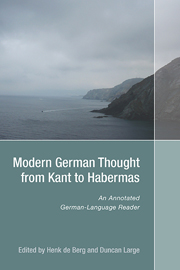Book contents
- Frontmatter
- Contents
- Acknowledgments
- Introduction: German Thought since Kant
- 1 Immanuel Kant (1724–1804)
- 2 Georg Wilhelm Friedrich Hegel (1770–1831)
- 3 Ludwig Feuerbach (1804–72)
- 4 Arthur Schopenhauer (1788–1860)
- 5 Karl Marx (1818–83)
- 6 Friedrich Nietzsche (1844–1900)
- 7 Sigmund Freud (1856–1939)
- 8 Martin Heidegger (1889–1976)
- 9 Walter Benjamin (1892–1940)
- 10 Georg Lukács (1885–1971)
- 11 Max Horkheimer (1895–1973) and Theodor W. Adorno (1903–69)
- 12 Jürgen Habermas (b. 1929)
- Index
- About the Editors
3 - Ludwig Feuerbach (1804–72)
Published online by Cambridge University Press: 05 September 2014
- Frontmatter
- Contents
- Acknowledgments
- Introduction: German Thought since Kant
- 1 Immanuel Kant (1724–1804)
- 2 Georg Wilhelm Friedrich Hegel (1770–1831)
- 3 Ludwig Feuerbach (1804–72)
- 4 Arthur Schopenhauer (1788–1860)
- 5 Karl Marx (1818–83)
- 6 Friedrich Nietzsche (1844–1900)
- 7 Sigmund Freud (1856–1939)
- 8 Martin Heidegger (1889–1976)
- 9 Walter Benjamin (1892–1940)
- 10 Georg Lukács (1885–1971)
- 11 Max Horkheimer (1895–1973) and Theodor W. Adorno (1903–69)
- 12 Jürgen Habermas (b. 1929)
- Index
- About the Editors
Summary
Life and Work
Ludwig Feuerbach was born in Landshut, Bavaria, in 1804. His father was a politically liberal jurist of international renown; one of Ludwig's brothers, Karl Wilhelm, would make a name for himself in mathematics; and one of his nephews, Anselm, was to become a famous painter. In 1823, Feuerbach started studying theology in Heidelberg, where, through the teaching of Karl Daub, he became an enthusiastic adherent of Hegelianism. After two semesters, he moved to Berlin to study with Hegel himself, switching from theology to philosophy in the process. He completed his studies at the University of Erlangen in 1828 with a doctoral dissertation entitled De infinitate, unitate atque communitate rationis (On the Infinity, Unity, and Universality of Reason).
In 1829, Feuerbach began to teach philosophy at Erlangen, not as a professor but as a lowly Privatdozent. A year later, he published a short book that would soon prove an insurmountable obstacle to his advancement or indeed to any state-sponsored position: Gedanken über Tod und Unsterblichkeit, a popular tract that argued against the Christian belief in a personal god and the immortality of the soul. Over the next eight years, Feuerbach devoted most of his intellectual energy to writing interpretive studies in the history of philosophy as well as reviews for the Jahrbücher für wissenschaftliche Kritik, the main organ of Hegelian philosophy. In 1837, after having resolved another amorous entanglement, he married his fiancée, Bertha Löw, and moved to the countryside to live as an independent author. By now, he had abandoned all hope of, and desire for, a tenured academic position.
- Type
- Chapter
- Information
- Modern German Thought from Kant to HabermasAn Annotated German-Language Reader, pp. 81 - 96Publisher: Boydell & BrewerPrint publication year: 2012



